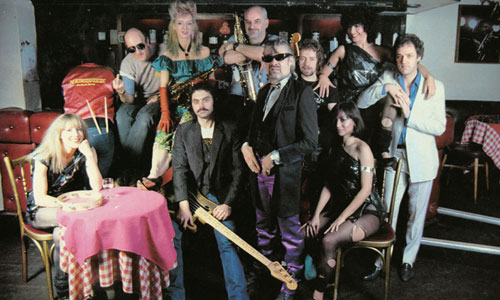Dick Heckstall-Smith:
Sadly, the masterful saxophone
player Dick Heckstall-Smith died on Dec. 17 2004.
Please read the obituary by Stephanie Thorburn at the following web address:
http://www.grahambond.net/soulsurvivor.html
Below is an article, full of insight, which Stephanie Thorburn completed before Dick's death, kindly sent to us by Stephanie.
Seventy
Years Of The Godfather On Tenor Sax.
Dick Heckstall-Smith In Perspective. By Stephanie
Thorburn.
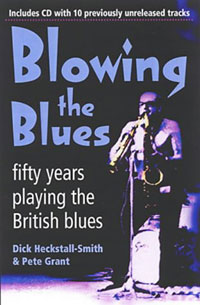 Iconic
images. The electrification of
Iconic
images. The electrification of
The blues is not the simplest form of technical or emotional interplay to master. The efficacy shown by white protagonists such as Dick Heckstall-Smith in preaching as exponents often leaves question marks in the minds of most critics as to the source of that understanding? One underlying basis of negativity for the soul of the working jazz or bluesman would indeed seem to be the hustling dollar lifestyle and precarious social scene itself. Dick has always been forthcoming, construing “economically and hilariously” the high and low periods of his career. He has not only evolved his own trademark tenor sax sound, but is an original, innovative composer/performer, interlocking and breaking down barriers between both jazz and blues as forms, with an instinct for eclectic innovation within both genres.
For Dick without a doubt the most fundamental challenge in his career has been significantly placed bouts of serious ill health, acting in many ways to fuel his innate creative depths and striving. The appearance of an excruciating lumbar disc condition in 1973 proved to be a serious episode for him, overshadowed in 1992 by the advent of a further more concerning health episode. During a bypass operation he suffered two severe strokes, leaving him unconscious for six days. On returning to the daylight of the world, he could neither think nor talk initially and had to re-learn otherwise simple processes such as movement and speech. Dick is however simply a soul survivor and despite a series of enforced amnesties of his sax into its case, he has utilised near death experiences philosophically. Such down time has merely been expressed through the awakening of a healthy, pragmatic and intellectual consciousness creatively.
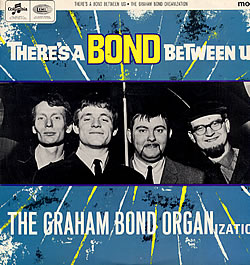 Not
as much has been documented upon Dick’s career post the heyday of his time
spent in the Graham Bond Org. with Jack
and Ginger, and Jon Hiseman’s
Colosseum. DH-S has always
explored strong musical ambitions, his thoughts post Colosseum
were expressed beautifully in a conversation with author and friend Harry
Shapiro. His explicit wish
was to evoke a whole new “continent of music” yet to be realised between folk,
classical, blues, contemporary composition and quality soloing, (1). He took his vision a little further initially
with band Manchild, enjoying a six-week American tour with
Fleetwood Mac and Deep
Purple. By 1972 he had enough
material for a self-composed solo band album, fresh with compositions that
did not fit the mould of Colosseum entirely.
The close support of colleagues established a proactive familiar secure
base for A Story Ended, provided by namely Pete Brown-
lyrics and Jon Hiseman- production/ composition; (a project
recently updated and re-released). Following a study sabbatical, his back problems
healed, Dick and Art Themen can be heard on Alexis
Korner’s 50th birthday Party album, his re-engagement
with music continuing with The Tough Tenors, a rather loose
jazz outfit; both striking projects placed just prior to one of Dick’s most
fundamental explorations in genre towards back to basics roots bands, Mainsqueeze.
Not
as much has been documented upon Dick’s career post the heyday of his time
spent in the Graham Bond Org. with Jack
and Ginger, and Jon Hiseman’s
Colosseum. DH-S has always
explored strong musical ambitions, his thoughts post Colosseum
were expressed beautifully in a conversation with author and friend Harry
Shapiro. His explicit wish
was to evoke a whole new “continent of music” yet to be realised between folk,
classical, blues, contemporary composition and quality soloing, (1). He took his vision a little further initially
with band Manchild, enjoying a six-week American tour with
Fleetwood Mac and Deep
Purple. By 1972 he had enough
material for a self-composed solo band album, fresh with compositions that
did not fit the mould of Colosseum entirely.
The close support of colleagues established a proactive familiar secure
base for A Story Ended, provided by namely Pete Brown-
lyrics and Jon Hiseman- production/ composition; (a project
recently updated and re-released). Following a study sabbatical, his back problems
healed, Dick and Art Themen can be heard on Alexis
Korner’s 50th birthday Party album, his re-engagement
with music continuing with The Tough Tenors, a rather loose
jazz outfit; both striking projects placed just prior to one of Dick’s most
fundamental explorations in genre towards back to basics roots bands, Mainsqueeze.
Sweet Pain, The Famous Blues
blasters, Mainsqueeze.
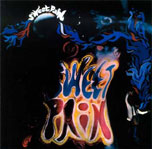 Undoubtedly
saxophonist Dick Heckstall-Smith’s fruitful years with illustrious Mainsqueeze
are routed in some fairly significant musical lineage. The now highly sought after Sweet Pain
sessions (1969) featured the precursor line-up to the Bluesblasters
and Mainsqueeze, representing a truly fundamental collaboration
of musical protagonists. Members of
Alexis Korner’s Blues Incorporated and John
Mayall’s Bluesbreakers assembled to record some impromptu blues
sessions, released on Mercury. The
Melody Maker summarised Sweet Pain as simply a, “Hot and heavy blues set from
British musicians Dick Heckstall-Smith, John
O’Leary, Keith Tillman and Annette Brox.”
(2) An air of competence pervaded the LP and reviews received, but the consensus
was undoubtedly that these aficionado blues musicians at this stage lacked
a degree of commercial appeal, utilising rather raw and ‘primitive’ rhythms.
Like an experienced vintage the line-up continued under further guises,
evolving to The Famous Bluesblasters, whom provided Dick
with a semi- professional unit playing as he recalls mainly at weekends, thus
caught in the rather lack lustre cultural climate of the time towards cutting
edge blues.
Undoubtedly
saxophonist Dick Heckstall-Smith’s fruitful years with illustrious Mainsqueeze
are routed in some fairly significant musical lineage. The now highly sought after Sweet Pain
sessions (1969) featured the precursor line-up to the Bluesblasters
and Mainsqueeze, representing a truly fundamental collaboration
of musical protagonists. Members of
Alexis Korner’s Blues Incorporated and John
Mayall’s Bluesbreakers assembled to record some impromptu blues
sessions, released on Mercury. The
Melody Maker summarised Sweet Pain as simply a, “Hot and heavy blues set from
British musicians Dick Heckstall-Smith, John
O’Leary, Keith Tillman and Annette Brox.”
(2) An air of competence pervaded the LP and reviews received, but the consensus
was undoubtedly that these aficionado blues musicians at this stage lacked
a degree of commercial appeal, utilising rather raw and ‘primitive’ rhythms.
Like an experienced vintage the line-up continued under further guises,
evolving to The Famous Bluesblasters, whom provided Dick
with a semi- professional unit playing as he recalls mainly at weekends, thus
caught in the rather lack lustre cultural climate of the time towards cutting
edge blues.
Finally re-assembling as Mainsqueeze in the early 1980’s, the new incarnation contained a truly strong and comprehensive line-up which Dick reflects on as a “great band, but a ponderous size; each member was just so good”.. The new blues band featured Dick on alto, tenor and soprano sax, Diana Wood on vocals and alto sax, Keith Tillman (ex-Bluesbreakers) bass, John O’Leary (Savoy Brown) harmonica, Eric Bell (ex-Thin Lizzy) guitar, Dave Moore, Roland organ, Victor Brox (ex-Blues Incorporated) vocals, trumpet and Keith Hartley (ex-Bluesbreakers) on drums; later replaced by Stretch. The sheer size and comparable abilities of the musical unit presented clear parallels with not only an original ‘back to basics’ blues outfit, but also a fully dimensional cabaret act playing within traditions from Chicago to Cyril Davies orientated blues. John O’Leary described the main raison d’etre for the band as being to not only deliver cutting edge blues, but to also look good and be overtly entertaining. To this end, Mainsqueeze was successful. Despite the disadvantage of the fallow period for blues, Mainsqueeze enjoyed the attentions of not only certain sectors of the music press, but also R &B rock protagonist such as of Jeff Beck and Alexis Korner who frequented the audience at some remarkable gigs. The band emulated quality R n’ B from the heart, as much for the purposes of self-indulgence as audience appreciation.
A principal close
to Dick’s heart is the spirit of adventure and risk in his musical endeavours.
Certainly Mainsqueeze fulfilled these ideals, but
the seeds of built in obsolescence were present in the life of the band purely
performing within the
Bo
Diddley- The Originator.
The scale and
dimensions of Mainsqueeze whilst they existed as an eight-piece
band with road crew was proving to be an expensive venture to finance. Unsurprisingly, despite enjoying many accolades
in
 Eric
Bell (photo left), Keith Tillman and Stretch
remained with DH-S in ‘Mainsqueeze II’, providing vital backing
for Bo’s performance, master licks and plans.
Tapes of gigs performed at the
Eric
Bell (photo left), Keith Tillman and Stretch
remained with DH-S in ‘Mainsqueeze II’, providing vital backing
for Bo’s performance, master licks and plans.
Tapes of gigs performed at the
When interviewed, Dick is most effusive about this area of his career as taking its place as an, “entirely positive and mutually beneficial collaboration and musical experience”. He describes Bo Diddley as, “the most gentlemanly creature on the face of the earth”, reflecting that he was as much ‘one of us’ as he could be. For a short space of time Bo Diddley was Mainsqueeze and Mainsqueeze was Bo, with the greatest treat of all being to perform straight blues numbers to audiences. Within the politics of the band there was no sense of overshadowing because after all, Bo was the ‘real thing’ and as Dick reflects, the whole period served to re-assure Mainsqueeze that so were they, at times they could not contain their musical affections, simply falling ‘all over him.’ As a natural performer, Bo was easy to work with; his primary ethics of no drugs, alcohol and general state of normality were undoubtedly a breath of fresh air. Certainly the band would have benefited from fuller audience and commercial recognition to have ultimately achieved wider success and acknowledgement. Dick cites Mainsqueeze’s lack of serious or dedicated management with a necessary degree of ‘punch’ (4) as central in the demise of the band after three and a half years, a situation fairly typical of blues bands as a whole. “Big time personal kudos and general delight at the quality,” can’t be bad as his predominant memories of this time with Bo Diddley though; a somewhat underrated blues-rock originator and pioneer extraordinaire.
Vintage Colosseum/ Anniversary DH-S.
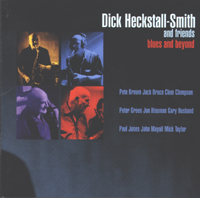 Now
into the next millennium, Dick Heckstall-Smith’s reputation and popularity
has been established throughout five decades.
Despite greater commercial success and performances in
Now
into the next millennium, Dick Heckstall-Smith’s reputation and popularity
has been established throughout five decades.
Despite greater commercial success and performances in
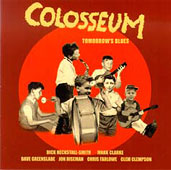 On
reaching his seventieth birthday this September, Dick is sadly unwell once
again, yet he has certainly left a sophisticated mark upon Colosseum’s recent
studio album ‘Tomorrow’s Blues.’ Might I leave the most fitting testament to
this true godfather of tenor sax, for his son Arthur to encapsulate?
On
reaching his seventieth birthday this September, Dick is sadly unwell once
again, yet he has certainly left a sophisticated mark upon Colosseum’s recent
studio album ‘Tomorrow’s Blues.’ Might I leave the most fitting testament to
this true godfather of tenor sax, for his son Arthur to encapsulate?
“The man is seventy years old this September. He has been to all intents and purposes ignoring the ageing process, still busy blowing, touring, recording, struggling to make ends meet. I often stand in awe...”
Copyright Stephanie Thorburn 2004.
* I would like to offer a special thanks to both Dick Heckstall-Smith and John O’Leary for their assistance in my research for this feature.
Dick Heckstall-Smith and Friends, ‘Blues and Beyond’ is available at: -http://www.bluestormmusic.com/dhs.html
‘Blowing The Blues- Fifty Years Playing the British Blues’ is Dick’s biography, published by Clear Books priced £16.95- ISBN 1-904555-04-7
http://www.clearpress.co.uk/book.cfm?id=6
Footnotes: -1. Shapiro, Harry Blueprint, ‘Sax Blue’, December 1997, Volume 2, Issue 6.2. The Melody Maker- Review of Sweet Pain, (Mercury), April 1969.
3. http://personales.jet.es/banshee/ Eric Bell website- Interview with John O’Leary on Mainsqueeze
4. Op cit.
Links: http://personal.inet.fi/private/tapani.taka/heckstal.htm

